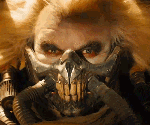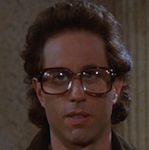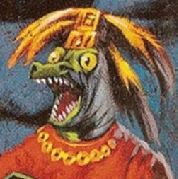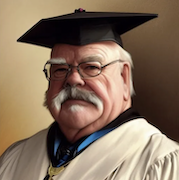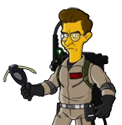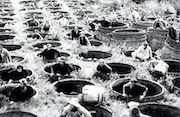|
Timby posted:How in the blue hell does this have anything to do with Star Trek? Jesus loving Christ, this is as bad as the 150 pages about fascism in the Pacific Rim thread. There are two other Star Trek threads currently, and this thread would be totally dead otherwise. I didn't see the harm in finishing a discussion that was started here. Sorry for the derail though. There's no real need to move to a new thread as this will probably be my final post on the topic. Art is subjective, and as such we are each entitled to our own interpretations of art. A perfectly enlightenend being might be able to appreciate all art for it individual merits, but I am stuck preferring art that speaks to my interests and life outlook. Art that fits my taste. In the search for artist that produce works that fit my taste, authorial intent is a factor. It may not be the main factor, but I don't know how you can say that I would be equally well served by simply watching everything to if I like it. I might, in fact, like everything, but I think that it is obtuse to deny that intent is in fact relevant to the subjective way in which we imperfect humans select and prioritize content. drat we do need to move this into another thread because now I want to discuss non-intent related effects that are dependant on the author... edit: Whatever thread we move this to, I would like to discuss an artist relationship with their art regardless of medium, be it film, writing, music, etc. Snak fucked around with this message at 01:19 on Jul 9, 2014 |
|
|
|

|
| # ? May 23, 2024 16:54 |
|
Timby posted:How in the blue hell does this have anything to do with Star Trek? Jesus loving Christ, this is as bad as the 150 pages about fascism in the Pacific Rim thread. With the original Star Trek, the 'intent' was to depict how a utopian society deals with new challenges as it expands outwards. The show would propose such technologies as the 'universal translator' that allows for perfect communication and, thus, perfect harmony. "Already, computers offer the potential of instantaneous translation of any code or language into any other code or language. If a data feedback is possible through the computer, why not a feed-forward of thought whereby a world consciousness links into a world computer? Via the computer, we could logically proceed from translating languages to bypassing them entirely in favor of an integral cosmic unconsciousness somewhat similar to the collective unconscious envisioned by Bergson. The computer thus holds out the promise of a technologically engendered state of universal understanding and unity, a state of absorption in the logos that could knit mankind into one family and create a perpetuity of collective harmony and peace." -McLuhan, 1969 'Unintentionally', this utopia was actually several shades of hosed up - something that became increasingly clear as the universe was expanded upon with sequels and spin-offs. You would never see anything in the original series like the episode of Voyager where the feds enslave AI workers and force them to perform dangerous tasks. What McLuhan described above as a borderline-communist Christian ideal to be fought for has been coopted into that fantasy of 'the singularity', AKA 'the rapture for nerds' - and the series has changed to keep pace. That's to say there are multiple competing 'intents' here. The basic two: envisioning a utopian society, and rigorously criticizing these visions. These latest films function as a way of shifting emphasis back onto the utopian part. You now have longtime fans pissed about Christian imagery (magic blood) and a shift from multiculturalism to class conflict (Khan is no longer a dude in brownface, but a Blade Runner replicant). These changes, however, not only return the series to its roots, but improve upon it - addressing such things as the supposed inevitability of war with 'the Klingon Empire'. Debate over the 'intentionality' of the films is a cheap tactic of avoiding these political concerns. SuperMechagodzilla fucked around with this message at 02:00 on Jul 9, 2014 |
|
|
|
SuperMechagodzilla posted:With the original Star Trek, the 'intent' was to depict how a utopian society deals with new challenges as it expands outwards. The show would propose such technologies as the 'universal translator' that allows for perfect communication and, thus, perfect harmony. If you replace the original series with The Next Generation, you're pretty right. TOS actually portrayed Starfleet as trying to adhere to utopian ideas and failing frequently. TOS was about the struggle for utopia, whereas Gene insisted that it had been achieved by the time of TNG.
|
|
|
|
The way Roddenberry wrote about the future-utopia in his script doctorings was hilariously ham-fisted by-the-by, and actively made a lot of otherwise interesting episodes worse. The better episodes are the ones he couldn't possibly have edited to be about how we can feed people with spaceships because on the surface they must have looked too goofy and about being attacked by giant housecats in the illusions of mind-aliens made from literal pipecleaners, so they ended up having more room for interesting stuff to happen without lovely ideology crammed everywhere. Good sci fi writers were hired for early star trek, and when they were given room to tell good stories it showed. The original script to guardians of forever is a brilliant analysis of Kirk and the problems with him as a hero - which of course got whitewashed. On top of that, in ToS the way of achieving utopia is essentially dealing with those guys, the reptilian jews etc. - the post-racism world is achieved by pressing the problems in how people treat each other outwards, onto the 'literal' aliens.
|
|
|
|
Hbomberguy posted:being attacked by giant housecats in the illusions of mind-aliens made from literal pipecleaners, so they ended up having more room for interesting stuff to happen without lovely ideology crammed everywhere What's this referring to?
|
|
|
|
Lord Krangdar posted:What's this referring to? Season 2, Episode 7: "Catspaw"  Edit: I realise now I took this screenshot from the remastered editions, where the really-REALLY-obvious wires that puppeteered them were edited out. So imagine this, but worse. Hbomberguy fucked around with this message at 02:56 on Jul 9, 2014 |
|
|
|
Hbomberguy posted:The original script to guardians of forever is a brilliant analysis of Kirk and the problems with him as a hero - which of course got whitewashed. Can you expand on this? I know it's not movie related but it sounds interesting as hell.
|
|
|
|
SuperMechagodzilla posted:With the original Star Trek, the 'intent' was to depict how a utopian society deals with new challenges as it expands outwards. The show would propose such technologies as the 'universal translator' that allows for perfect communication and, thus, perfect harmony. The original Star Trek was never depicting a utopia. It was depicting a relatively decent society that still has major problems with militarization like in The Ultimate Computer and barely-surpressed rage like in Mirror Mirror. Spock was created as a way to comment on our failings and our successes. You are completely off-base here. Hbomberguy posted:On top of that, in ToS the way of achieving utopia is essentially dealing with those guys, the reptilian jews etc. Just who are you talking about here? penismightier fucked around with this message at 05:00 on Jul 9, 2014 |
|
|
|
SuperMechagodzilla posted:Khan is no longer a dude in brownface This is a pretty gross thing to say about Ricardo Montalban, dude.
|
|
|
|
Jack Gladney posted:This is a pretty gross thing to say about Ricardo Montalban, dude. People were literally justifying his casting vs Cumberbatch with "brown people look more alike so that's okay" a few pages ago.
|
|
|
|
computer parts posted:People were literally justifying his casting vs Cumberbatch with "brown people look more alike so that's okay" a few pages ago. But he wasn't in brownface? Cross-racial casting is a super complicated issue with a varied past. It literally depends on what you think the value is. If you think that non-white (sometimes called 'minority') representation in hollywood is an important issue, than any minority casting is favorable. Unless they are cast as a villain, in which case you might be demonizing minorities. Khan is a tricky issue because he is textually a minority and a villain, but has never been played by a minority, depending on whether you consider light-skinned Hispanics to be a minority or not. Is Khan a racist character because he is a non-white other? Should Khan textually have been white originally but was cast hispanic in order to be more 'other'? is Khan textually a non-offensive characterization of a minority, played by a white (non-minority) Hispanic ( minority?) This has already been discussed to death in this very thread. It turns out that the solution is not black and white. It's also not Asian or British, or Hispanic or Indian. We can keep talking about it. That's not a bad idea, but we can't keep talking about it in terms like "such and such is obviously offensive" because holy poo poo the character concept of Khan is problematic in the first place. Which is funny, because JJTrek threw out that problematic concept, and we decided that was problematic to. Like should modern versions of Othello even be black? everyone stop acting like being in favor of one casting choice or another makes someone a racist.
|
|
|
Snak posted:That's not a bad idea, but we can't keep talking about it in terms like "such and such is obviously offensive" because holy poo poo the character concept of Khan is problematic in the first place. Is the original concept of Khan really that offensive? He's just your average run of the mill genetic superman/genius that you find in a lot of science fiction from that period.
|
|
|
|
|
Jack Gladney posted:This is a pretty gross thing to say about Ricardo Montalban, dude. In Space Seed, Montalban is literally done up in dark makeup to look 'Indian'. This was quietly retconned in Star Trek 2. penismightier posted:The original Star Trek was never depicting a utopia. It was depicting a relatively decent society that still has major problems with militarization like in The Ultimate Computer and barely-surpressed rage like in Mirror Mirror. Spock was created as a way to comment on our failings and our successes. You are completely off-base here. I don't think Ultimate Computer really criticizes the core policies of the federation, although that is a good oppositional reading. I mean, the basic storyline is this mad scientist who steps in and upsets the established order with his 'progress', with the conclusion being that things were already ideal. It's only when you stop to think about the implications that you realize the 'insane computer' goes 'insane' because it's programmed to stop men from "dying for galactic space, which is neither ours to give or to take!" It gives the scientist being shipped off to 'rehabilitation' a dark edge. This sort of oppositional reading is precisely what you would see in later Star Trek like DS9, where the federation is directly compared to the Borg. Even then, the Feds being 'the good guys' is still largely unquestioned. Mirror Mirror makes the case, like in the various Klingon episodes, that the opposite-equivalent of the Federation is Empire. I haven't seen that one in a while, but I recall that they make the Evil Universe a better place while not changing themselves in any appreciable way. That, I think, would challenge the 'relatively decent society': understanding that this mirror world actually reveals their own essence.
|
|
|
|
Bob Quixote posted:Is the original concept of Khan really that offensive? He's just your average run of the mill genetic superman/genius that you find in a lot of science fiction from that period. That part is not offensive. It only becomes problematic if his ethnicity is somehow integral to his character. If his identity is purely that of a genetic superman/genius, then there is no reason he could not be white and British. If his ethnicity is integral to his character, then why is it? edit: to SMG: what about The Omega Glory or Patterns of Force? Snak fucked around with this message at 08:40 on Jul 9, 2014 |
|
|
|
Snak posted:That part is not offensive. It only becomes problematic if his ethnicity is somehow integral to his character. If his identity is purely that of a genetic superman/genius, then there is no reason he could not be white and British. I don't really think there's anything about Khan's race in particular that was essential to the character, but it does seem silly for the whitest dude in Britain to play a guy named Khan Noonian Singh.
|
|
|
|
SuperMechagodzilla posted:Mirror Mirror makes the case, like in the various Klingon episodes, that the opposite-equivalent of the Federation is Empire. I haven't seen that one in a while, but I recall that they make the Evil Universe a better place while not changing themselves in any appreciable way. That, I think, would challenge the 'relatively decent society': understanding that this mirror world actually reveals their own essence.
|
|
|
|
penismightier posted:Just who are you talking about here? All of the vaguely humanoid space aliens that humanity doesn't get along with? Usually stereotypes of currently-existing ethnicities - but because all of humanity gets along, that makes it okay. 'the problem' of racism, closeted racism, ideology etc. is never really solved. This is why Into Darkness' presentation of the Feds as already-corrupt and warmongers 'just trying to help the federation/humanity survive' and essentially trying to kickstart a war with the klingon empire is really darn observant. Hbomberguy fucked around with this message at 13:59 on Jul 9, 2014 |
|
|
|
Hbomberguy posted:All of the vaguely humanoid space aliens that humanity doesn't get along with? Usually stereotypes of currently-existing ethnicities - but because all of humanity gets along, that makes it okay. 'the problem' of racism, closeted racism, ideology etc. is never really solved. This is why Into Darkness' presentation of the Feds as already-corrupt and warmongers 'just trying to help the federation/humanity survive' and essentially trying to kickstart a war with the klingon empire is really darn observant. I was watching TNG last night and I couldn't get over just how Shakespearean the Klingons are. Obviously the Klingons were originally intended to be mongoloid in their original interpretation, racist charicatures of the warlike uncivilized peoples of the world. But, in TNG, the Klingons take on a more universally human nature, they have very Shakespearian notions of honor and valor, the more violent among them are outcasts. Warf is caught in the middle of all of this, battling with his antiquated notions of a warriors code that is literally his biotruth, and overcoming it with reason.
|
|
|
|
The Walking Dad posted:I was watching TNG last night and I couldn't get over just how Shakespearean the Klingons are. Obviously the Klingons were originally intended to be mongoloid in their original interpretation, racist charicatures of the warlike uncivilized peoples of the world. But, in TNG, the Klingons take on a more universally human nature, they have very Shakespearian notions of honor and valor, the more violent among them are outcasts. Warf is caught in the middle of all of this, battling with his antiquated notions of a warriors code that is literally his biotruth, and overcoming it with reason. And this is precisely what makes the whole thing so insidious. The Klingons have to overcome their own society's codes and immoralities in order to 'become like us', the good guys. The Federation is basically absorbing other species while not really incorporating them. We turn them into us, under the guise of the search for reason or progress or whatever. But how reasonable is the Federation? That depends on how you view it, I suppose. One of the subtler jokes of Voyager is that it begins with a battle between the Feds and the Maquis, essentially rebels who don't want to be under their rule (the show and fans make them out to be mega-terrorists to avoid dealing with the question of what you do when people don't want to be in the federation). They realise they 'have to join forces to survive' - and immediately they all put on Starfleet uniforms and effectively become Feds. The tension between the two groups dissolves almost immediately (it gets brought up very occasionally in episodes but the characters basically get on fine between these occurrences). In other words, the Maquis get absorbed. WarLocke posted:Can you expand on this? I know it's not movie related but it sounds interesting as hell. Kirk realises he is willing to destroy all of history for the woman he loves (she has to die or it'll gently caress up the history that leads to starfleet) and Spock has to stop him - and also physically restrains another officer (an amoral drug-dealer) from trying to save her life. Kirk is (almost, only Spock's cautious reminding stops him) willing to literally make starfleet never have existed to save this one woman's life. Spock in his cold logical way deliberately stops someone from helping her merely to preserve history exactly as it was. It's perceptive of the flaws in both characters and they both come out of the experience changed a little, and understand each other more. They also learn that, even within the drug-dealing amoral officer who is going to get executed, there lies a moral core that won't just let someone die needlessly. What I like about that last part is how it leaves open the possibility that a combination of all three of these characteristics might one day manifest and make the Federation truly Good. In the version that aired, there's no drug dealing officer at all - because why would anyone in the Federation EVER Do A Bad Thing?! On top of that, Kirk takes Spock's advice onboard almost immediately - his love for her feels false when he's basically willing to let her die for the good of time like a true hero(?!). On top of that, Kirk stops McCoy from saving her, to re-demonstrate his commitment to history or something. The only pathos is that Kirk Feels Really Bad About It. The episode's still pretty good, but the changes and the reasoning behind them allow for a very interesting look into Roddenbery's priorities and the ideology behind the show. Harlan Ellison is basically one of my favourite writers and seeing his attitude get filtered through Gene's lens is really something.
|
|
|
|
The Walking Dad posted:I was watching TNG last night and I couldn't get over just how Shakespearean the Klingons are. Obviously the Klingons were originally intended to be mongoloid in their original interpretation, racist charicatures of the warlike uncivilized peoples of the world. But, in TNG, the Klingons take on a more universally human nature, they have very Shakespearian notions of honor and valor, the more violent among them are outcasts. Warf is caught in the middle of all of this, battling with his antiquated notions of a warriors code that is literally his biotruth, and overcoming it with reason. The Klingons claim to have a society of honour and valor; as the series goes on it becomes more and more obvious that that's something of a sham, and they simply put up a front of these values whilst actually having a society corrupt and decadent. Worf's biggest struggle regarding the Klingon empire is the difference between the Warrior's code that he was exposed to and the actualities of the modern, thoroughly rotten empire where the least honourable have risen to power.
|
|
|
|
SuperMechagodzilla posted:I don't think Ultimate Computer really criticizes the core policies of the federation, although that is a good oppositional reading. I mean, the basic storyline is this mad scientist who steps in and upsets the established order with his 'progress', with the conclusion being that things were already ideal. I agree that the Federation are unequivocally the good guys in TOS, but I don't think that utopianism immediately follows from that. TOS devotes too much time to exploring the base fear and aggression in all of the characters - from Devil in the Dark to The Enemy Within to even Shore Leave. Don't forget ERrand of Mercy, which pointedly criticizes the militarization of the Federation over and over (even as Kirk doesn't realize it), and caps with: "Even the gods did not spring into being overnight." Hell, if you count the movie era as part of the same series, it's even more barbed - don't forget "let them die." The famous Roddenberry utopianism is a postscript to TOS, something that got into his mind in the TNG era. TOS presents a stable and open society but that is not a utopia and the show, unlike TNG, never pretends it is. Hbomberguy posted:All of the vaguely humanoid space aliens that humanity doesn't get along with? Usually stereotypes of currently-existing ethnicities - but because all of humanity gets along, that makes it okay. 'the problem' of racism, closeted racism, ideology etc. is never really solved. This is why Into Darkness' presentation of the Feds as already-corrupt and warmongers 'just trying to help the federation/humanity survive' and essentially trying to kickstart a war with the klingon empire is really darn observant. It's just featuring "reptilian jews" is a hell of a claim to lay at the show's feet, and the only one that even begins to fit the bill is TNG's depiction of the Ferengi.
|
|
|
|
The Walking Dad posted:I was watching TNG last night and I couldn't get over just how Shakespearean the Klingons are. Obviously the Klingons were originally intended to be mongoloid in their original interpretation, racist charicatures of the warlike uncivilized peoples of the world. But, in TNG, the Klingons take on a more universally human nature, they have very Shakespearian notions of honor and valor, the more violent among them are outcasts. Warf is caught in the middle of all of this, battling with his antiquated notions of a warriors code that is literally his biotruth, and overcoming it with reason. On the old show the Klingons were just another space civilization, but fascists or whatever. They did cold war stuff with spies and diplomats. All the space-sword warrior pony-tail stuff was Next Generation, or maybe some of the movies.
|
|
|
|
penismightier posted:The famous Roddenberry utopianism is a postscript to TOS, something that got into his mind in the TNG era. It got full-blown in TNG, but you can see the seeds in The Motion Picture. Basically, when Roddenberry discovered acid and cocaine, he gradually became a humanist. Another decade of cocaine and drinking later, we got TNG.
|
|
|
|
Timby posted:It got full-blown in TNG, but you can see the seeds in The Motion Picture. Basically, when Roddenberry discovered acid and cocaine, he gradually became a humanist. Another decade of cocaine and drinking later, we got TNG. Yeah, good point, and it's worth mentioning that he was iced out of the movies by the second one. In the series, particularly the first two seasons, you get lines like: "War, whether we want it, we've got it." "Curious how often you humans get what you don't want." Which would be unthinkable in the utopian era depiction of the Federation. Jack Gladney posted:On the old show the Klingons were just another space civilization, but fascists or whatever. They did cold war stuff with spies and diplomats. All the space-sword warrior pony-tail stuff was Next Generation, or maybe some of the movies. On top of that, the TOS Klingons were supposed to be space Russians, so their soldiers were space Cossacks. TNG did the weird thing where they made all the Klingons soldiers.
|
|
|
|
DrNutt posted:I don't really think there's anything about Khan's race in particular that was essential to the character, but it does seem silly for the whitest dude in Britain to play a guy named Khan Noonian Singh. The Indian super-warlord resolving into the whitest nerdly Brit possible is a political statement. The film, like it's counterpart "" Wars, is about colonialism in the wake of a neo-liberal global Empire (read here as the federation and there as the Republic and Empire), the "new order that envelops the entire space of... civilization". Danger fucked around with this message at 16:47 on Jul 9, 2014 |
|
|
|
The names sort of Korean anyway. And the original Khan was played by a pretty white looking Mexican.
|
|
|
Snak posted:That part is not offensive. It only becomes problematic if his ethnicity is somehow integral to his character. If his identity is purely that of a genetic superman/genius, then there is no reason he could not be white and British. Its been a while since I've seen that episode, but if I recall correctly the augmented humans came in a variety of races and Khan was just one of their best and brightest which is why he was the leader. The characters race could have been incidental since it wasn't really referenced more than once in the episode, but considering it was made in the 60's maybe they thought it would be cool to have the example of homo superior be someone other than a WASP? Perhaps that makes it racist in a different way, but its a well meaning sort of racism that wasn't uncommon for media from the period.
|
|
|
|
|
Khan, the greatest military leader on Earth who conquered most of Asia, is of course a direct reference to Genghis Khan, which makes the casting of Benedict Cumberbatch whitewashing on the caliber of John Wayne in The Conquerer.
|
|
|
|
Genghis Khan, famous for being a mexican in brownface.
|
|
|
|
Because they didn't do a good job in 1966 doesn't mean casting Cumberbatch in the year 2014 wasn't simply disgusting.
|
|
|
|
Bob Quixote posted:Its been a while since I've seen that episode, but if I recall correctly the augmented humans came in a variety of races and Khan was just one of their best and brightest which is why he was the leader. The characters race could have been incidental since it wasn't really referenced more than once in the episode, but considering it was made in the 60's maybe they thought it would be cool to have the example of homo superior be someone other than a WASP? Perhaps that makes it racist in a different way, but its a well meaning sort of racism that wasn't uncommon for media from the period. The episode is hilariously celebratory of him, too. He tries to take over the ship because his amazing will to conquer just overpowers him, and beyond stopping him from killing everybody Captain Kirk just kind of lets it go like "well, what do you expect from such a great man?" There's this part where they reminisce about learning about him in school, too, where they say he was the greatest conqueror because he did it all only killing when he absolutely had to and not for fun or racism like those other warlords (Hitler). It's actually creepy as gently caress.
|
|
|
|
There's definitely something very worth notice about how a character that was portrayed by a person of color during the height of the civil rights movement was recast as the whitest man alive without a second thought in a time where people will, unironically, insist that Racism Is Over.
|
|
|
|
|
Well they tried to cast a Puerto Rican...
|
|
|
Snak posted:Well they tried to cast a Puerto Rican... Benicio Del Toro is not the only nonwhite actor in Hollywood and I'm not sure why people bring one failed casting up as if it's an excuse.
|
|
|
|
|
I just really wish I'd seen a Benicio Del Toro version of the movie, I feel like it would've been vastly superior.
|
|
|
|
It was a bad movie.
|
|
|
|
MikeJF posted:I just really wish I'd seen a Benicio Del Toro version of the movie, I feel like it would've been vastly superior. I just realized I was reading Benicio del Toro but imagining Edward James Olmos. I can really see Olmos-Adama-Khan growling out "Now, shall we begin?"
|
|
|
|
mr. stefan posted:There's definitely something very worth notice about how a character that was portrayed by a person of color during the height of the civil rights movement was recast as the whitest man alive without a second thought in a time where people will, unironically, insist that Racism Is Over. Exactly. Montalban's casting wasn't particularly progressive (though a lot of other stuff in that original series was) but it was pretty much par for the course for what you'd expect of an American TV episode about six months before the Newark Riots, but Cumberbatch's is absolutely shockingly regressive.
|
|
|
|
mr. stefan posted:Benicio Del Toro is not the only nonwhite actor in Hollywood and I'm not sure why people bring one failed casting up as if it's an excuse. I mean, all of this has happened before, and all of this will happen again. I was joking because it's pretty loving racist to cast Hispanic people as Indian/Asian characters just because they're also not white. I mean, they could have made Khan black. He could have been Samuel L Jackson, Taye Diggs, Laurance Fishburn, or Forest Whitaker. Would that have been racist? But all of that only matters if Khan's ethnicity is important to his character. If the new Trek movies are supposed to continue the struggle for minority representation, the probably should have made more of the characters non-white. Literally any of the white characters could have been non-white. Unless their whiteness is somehow central to their character. Or because nerds would throw a fit if Kirk, Spock, Scotty, or Bones wasn't white. But maybe it would have been okay, BSG changed two male characters to female characters and it was a vast improvement. A bunch of nerds cried, but no one cared because they had terrible taste anyway. edit: Real opinion: even though Karl Urban is the best part of JJTrek, Bones would have been a great character to make black, since there is a shortage of black head doctors in mainstream fiction. THere's like ten thousand medical dramas on tv, and they all have some minority doctors, but every primary character (that I know of) is white. Snak fucked around with this message at 17:45 on Jul 9, 2014 |
|
|
|

|
| # ? May 23, 2024 16:54 |
|
Snak posted:If the new Trek movies are supposed to continue the struggle for minority representation, the probably should have made more of the characters non-white. Literally any of the white characters could have been non-white. Unless their whiteness is somehow central to their character. BSG was a full-on reboot. I know that the new Treks are basically reboots, but there's still the premise that they're a divergent universe. I mean, hell, the entire backstory for why they found Khan exactly when they did was fitted into the universe divergence setting.
|
|
|


